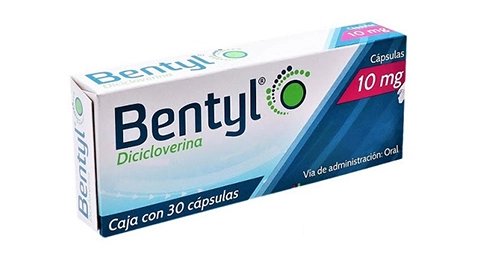Overview
Bentyl, with its active ingredient dicyclomine, is an antispasmodic medication primarily used to treat irritable bowel syndrome (IBS). It works by relaxing the smooth muscles of the gastrointestinal tract, reducing symptoms such as abdominal pain, cramping, and bloating. Available in tablets, capsules, and injectable solutions, Bentyl offers flexible administration options to meet diverse patient needs.
History and Approval
Dicyclomine was developed in the 1940s and received FDA approval in 1950 for treating gastrointestinal disorders, particularly IBS. Its long-standing use reflects its proven efficacy and favorable safety profile in managing IBS symptoms.
Key Benefits
- Cramp Relief: Effectively reduces abdominal and intestinal cramping.
- Symptom Control: Alleviates pain, bloating, and discomfort associated with IBS.
- Flexible Forms: Available in tablets, capsules, and injections for tailored administration.
- Quick Action: Provides rapid relief from IBS symptoms.
Unique Features
Bentyl stands out for its targeted action on gastrointestinal muscles, offering effective relief from cramping and pain without significantly altering overall bowel motility. Its rapid onset makes it a preferred choice compared to other antispasmodics.
Comparison with Other Treatments
Compared to similar medications, Bentyl provides:
- Focused Relief: Specifically targets gut muscles to reduce spasms.
- Faster Results: Quicker symptom relief than some alternatives.
- Versatile Options: Multiple formulations for patient convenience.
Safety and Tolerability
Bentyl is generally well-tolerated, with common side effects including dry mouth, dizziness, and blurred vision. Serious side effects, such as severe allergic reactions or confusion, are rare but require immediate medical attention. Regular monitoring by a healthcare provider is recommended to ensure safety.
Indications for Use
Bentyl is prescribed for:
- Irritable Bowel Syndrome (IBS): Manages abdominal pain, cramping, and bloating.
- Functional Gastrointestinal Disorders: Addresses abnormal gut motility symptoms.
Dosage and Administration
Adults: Typically start with 20 mg four times daily, adjustable to 40 mg four times daily based on response.
Children: Not recommended for those under 6 months; pediatric dosing is determined by a healthcare provider.
Elderly: Lower doses may be used to reduce risks like confusion or urinary retention.
Bentyl is best taken before meals and at bedtime to optimize symptom control. Food does not significantly affect its efficacy.
Mechanism of Action
Dicyclomine blocks muscarinic receptors in the gastrointestinal tract, inhibiting acetylcholine activity to reduce muscle spasms and alleviate pain. It primarily targets smooth muscle cells, minimizing cramping without broadly affecting bowel function.
Pharmacokinetics
Absorption: Rapidly absorbed, with peak plasma levels in 1–1.5 hours.
Distribution: Widely distributed, crossing the blood-brain barrier.
Metabolism: Processed in the liver to inactive metabolites.
Elimination: Excreted via urine with a half-life of about 1.8 hours.
Composition
Active Ingredient: Dicyclomine hydrochloride (10 mg or 20 mg tablets, 10 mg/5 mL syrup, 10 mg/mL injectable).
Inactive Ingredients: May include lactose monohydrate, magnesium stearate, and microcrystalline cellulose for formulation stability.
Side Effects
Common: Dry mouth, dizziness, blurred vision, nausea.
Rare: Confusion, urinary retention, constipation, allergic reactions.
Serious: Severe allergic reactions, significant confusion, or tachycardia require urgent medical attention.
Contraindications
Bentyl is not suitable for patients with:
- Hypersensitivity to dicyclomine or its components.
- Obstructive uropathy, severe ulcerative colitis, reflux esophagitis, or myasthenia gravis.
Precautions
Monitor for confusion, urinary retention, or allergic reactions, especially early in treatment. Avoid activities requiring clear vision or coordination if side effects occur. Do not combine with alcohol or other CNS depressants.
Drug Interactions
Bentyl may interact with anticholinergic drugs, MAO inhibitors, amantadine, or digoxin, potentially increasing side effects or altering efficacy. Always inform your healthcare provider of all medications being taken.
Overdose
Symptoms include severe dizziness, fainting, difficulty breathing, or irregular heartbeat. Seek emergency medical help immediately if an overdose is suspected.
Pregnancy and Breastfeeding
Use during pregnancy only if benefits outweigh risks, as animal studies show potential fetal harm. Dicyclomine is excreted in breast milk, so breastfeeding mothers should consult their healthcare provider.
Storage
Store at 20°C–25°C (68°F–77°F) in a dry, light-protected container, out of reach of children. Check expiration dates and dispose of unused medication properly.
Clinical Evidence
Clinical trials confirm Bentyl’s efficacy in reducing IBS symptoms, with significant improvements in pain and cramping compared to placebo. Its targeted action and safety profile make it a preferred choice for IBS management.
Conclusion
Bentyl is a reliable and effective treatment for IBS and related gastrointestinal disorders, offering rapid symptom relief and flexible dosing options. Patients should follow medical guidance, maintain a healthy lifestyle, and attend regular check-ups to optimize outcomes.




